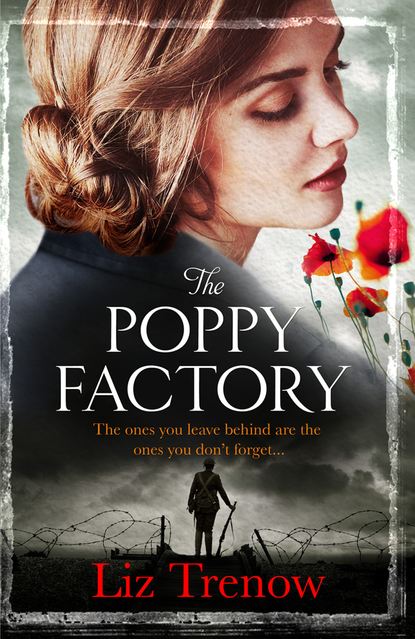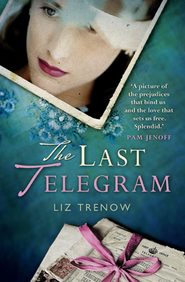По всем вопросам обращайтесь на: info@litportal.ru
(©) 2003-2024.
✖
The Poppy Factory
Настройки чтения
Размер шрифта
Высота строк
Поля
‘What about something to do with animals?’ Susan said. ‘You’ve always loved them, and when you were a very little girl – before you joined the St John Ambulance – you used to say you wanted to be a vet.’
‘It’s a six year training. Anyway you have to be super-bright. I’d never have got in with my two Bs and a C.’
They chatted for a while and then, out of the blue, her mother said, ‘You know what you told me about the leg of lamb today?’
‘Uh huh.’
‘It reminded me of something I’d read somewhere and it was really annoying me because I couldn’t remember where.’
‘And have you remembered now?’
‘I have. Something rather like that happened to your great-grandfather Alfred, too.’
‘Like what?’
‘He was in the First World War and came back injured – lost a leg. Afterwards he tried working as a butcher, but he couldn’t take it because the raw flesh reminded him of something he’d experienced in the war.’
‘That’s strange. How do you know all this, anyway?’
Her mother disappeared upstairs and returned a few minutes later with a small cardboard box. ‘It’s all in here,’ she said. ‘Your great-grandmother’s diaries.’
As Jess opened the box, a comforting, musty smell of old paper wafted out into the room. Inside were stacked six dog-eared notebooks, the old-fashioned kind once issued by schools, yellowing pages of cheap lined paper stapled between soft buff-coloured covers. On the front of each one was written, in a neat rounded hand in fading blue ink, ‘Rose Barker. PRIVATE’.
‘Oh my goodness, look at this. They were written by your grandmother? My great-grandmother?’
Susan nodded. ‘Everyone knew her as Rose but her full name was Jessica Rose. You are named after her. She died when I was only five so I barely knew her, but she was a tough cookie by all accounts.’
‘This is amazing. Why haven’t I seen these before?’
‘We only discovered them after granny died last year.’ Jess had been given leave to return home for the funeral but had to fly back immediately afterwards. She’d been sad not to be able to stay longer, to help her mother with the gloomy task of sorting out her grandmother’s belongings.
‘Have you read them yet?’ Jess said, starting to rifle through the notebooks.
‘Not completely. I got up to the bit about poor old Alfie but then I got too busy to carry on.’
‘Did you know about them before?’
‘Mum never mentioned them, but then her memory was pretty dodgy and I suspect she just forgot they were there, locked way in the attic all those years.’
‘Shall we look at them together, now?’ Jess asked
Susan looked at her watch and yawned. ‘Not tonight, love, it’s gone midnight,’ she said, stroking Jess’s hair. ‘Are you coming up?’
‘In a while,’ Jess said. ‘I’m not sleepy yet. I’m going to have a bit of a read, if you don’t mind. I’m really curious to find out about Alfie.’
‘Are you feeling better?’
Jess nodded. ‘Thanks for being so understanding, Mum.’
‘No drinking now?’ She gave her daughter a stern look.
‘I’ll do my best,’ Jess said. ‘See you in the morning.’
After her mother had gone, Jess made herself a cup of coffee with a whisky chaser, and placed the cardboard box beside her on the sofa. Milly came to join her, snuggling her furry face onto Jess’s knee.
She lifted out the top notebook and flicked through the pages filled with the same careful handwriting, interspersed with stuck-in cuttings and letters. Then she checked the dates on the other notebooks to make sure they were in the right order, and began to read.
BOOK ONE
Rose Barker – PRIVATE
Monday 11 November 1918.
RED LETTER DAY!
Even now I have to pinch myself!
I have sorely neglected my writing since starting at the munitions factory, having felt so exhausted and dispirited each evening, and my entries so dull. I found these notebooks on a charity stall a few weeks ago and they are begging to be filled. And now there is so much to tell I barely know where to begin.
Today started out as another gloomy winter Monday with us all bent over our benches carefully filling shells with ‘devil’s porridge’ and then, at 11 o’clock this morning, the siren wailed. We jumped out of our skins, of course, we always do. Explosion warning? An air raid? Everyone stood stock still, looking at each other over our respirators like yellow-faced frogs. And then we twigged. We’d heard rumours and read plenty of reports in the newspapers, but no-one really believed them. There’ve been so many false promises. Could it really happen this time?
Then the boss came over the tannoy and told us it was official: fighting had been suspended on the Western Front. A moment later all the church bells of East London started clanging with a deafening din – such a surprising sound that we hadn’t heard for four years – and we were cheering and laughing so loud that we couldn’t hear the rest of what he said. But the word got round soon enough: not that we’d have gone on working, in any case, but they were closing the factory for the day.
We threw off our overalls, grabbed our coats and tumbled out into the street like a pack of puppies, where there was already such a great crush of excited people singing and cheering, running and dancing, hugging and kissing, that we could barely make our way through the streets. Being so short, Freda was virtually carried along, and I had to hold her tight so as we wouldn’t get separated. A group of young lads adopted us: ‘Come on canaries,’ they yelled, ‘we’ll look after you, show you a good time.’
On a normal day we wouldn’t have given them a second glance, but the world had suddenly been painted in bright colours and even spotty boys looked handsome. It may have been grey and a bit drizzly, but it felt as though the sun had come out, beaming down on us lot all lit up with happiness.
We had a notion to get ourselves to the West End and somewhere near Buckingham Palace cos word was that the King and Queen were going to come out and wave to us but there wasn’t a cat’s chance of that. The buses were crammed to the nines with people piled high on the top decks and hanging off the rear doorways, but they weren’t going anywhere due to the crowds. It was almost impossible to push your way through even on foot, so we just let ourselves be carried wherever the crowd took us.
We passed by Smithfield where a surge of greasy, blood-stained lads had poured out of the meat market, and on to the edges of the City where a great black wave of clerks and business types had pushed out onto the street. They were throwing their bowlers in the air, hanging out of windows and balconies and climbing lampposts, without a thought for their smart city clothes. No-one cared a jot.
The pubs were opening by now, and tankards being handed out around the crowd, and buntings being hung from upstairs windows so the city looked like a fairground. At one junction they’d set a wind-up gramophone going in an open window, and we started dancing to it. After a while, as we moved slowly forwards, the bands came out: the Sally Army, musicians from the clubs and just about anyone who had an instrument seemed to gather on every street corner and they played together, all the old favourites: Pack up Your Troubles and It’s a Long Way to Tipperary. If they stopped, someone would hand them each a pint and we’d shout for more till they tuned up again.
Freda and me both got horribly drunk and kissed a dozen unsuitable types, which as a married woman I really shouldn’t have, but we were so happy we just didn’t care.
Then there was a great roar from the crowd and people shouted ‘God Save The King’ again and again, and the musicians struck up with the national anthem. We were still in Cheapside and nowhere near The Mall, but word had spread through the crowd that King George and Queen Mary had come out onto the balcony of Buckingham Palace and waved to all those lucky beggars who managed to get within sight of them.
After He’s a Jolly Good Fellow, the crowd started on other songs and I was joining in happily until they struck up with the hymn All People That on Earth Do Dwell, and a sudden wave of sadness hit me. I don’t suppose the beer we’d drunk on empty stomachs helped, but my legs went wobbly and I felt as though I might fall over if I didn’t find somewhere to sit. I pushed my way through the crowd to the side of the road and found an empty doorstep.
Then the tears came, coursing down my face like a waterfall, as I remembered all those poor boys. Those thousands and thousands of boys, even millions, who were never coming back, who would never be able to celebrate the victory they lost their lives for. Not just Ray and Johnnie, but my uncles Fred and Ken and the three Garner brothers, Billy and Stan, Tony and Ernest, Joe, William and Tom Parsons. And those were just the ones in our neighbourhood we knew well.
After a while, Freda came and sat down beside me and put her arm around my shoulders.
‘What was it all for?’ I wailed. ‘They’ll never come home, never get married, have children or grow old.’
‘But my brother’s alive, Rose,’ she said, putting her arm around me. ‘That’s a blessing, isn’t it? It won’t be long before he’s home.’
We sat there for a while, both of us lost in our thoughts despite the great noise going on around us, until we realised that we were both ravenously hungry. Freda managed to grab the last two baked potatoes from a street vendor, and a cup of tea, which made us feel a little better.







